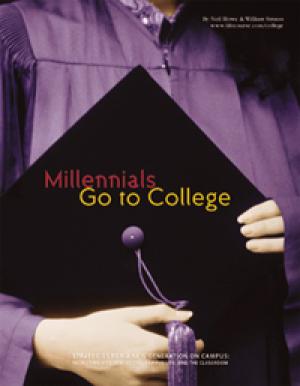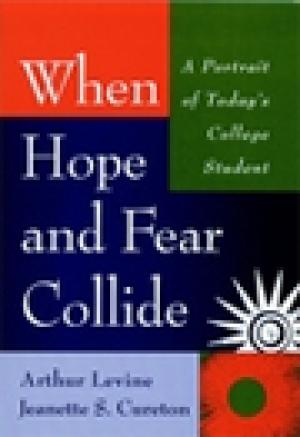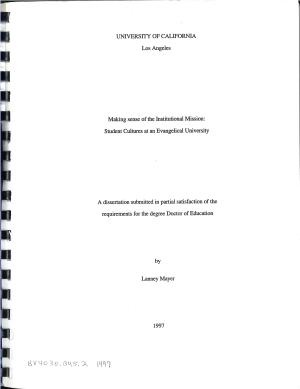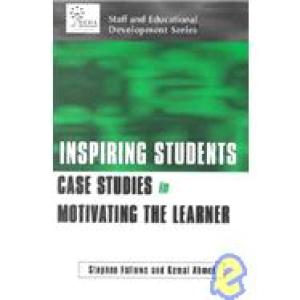Resources

In their fascinating study of this generation, Millennials Go To College, Howe & Strauss examine how these ‘kids' will re-shape our world, and it's an optimistic new world if their prediction holds true. Despite the facts that Millennials have not experienced many of the events that we older folks have, they are a determined bunch and, if they're successful, will re-energize much of our roller-coaster economy. (From the Publisher)

In his 1980 book When Dreams and Heroes Died, Arthur Levine presented a portrait of a generation of college students without heroes - a generation optimistic about their own futures, but pessimistic about the future of the country and the world. These students turned inward, away from activism and community and toward individual and material gain, a trend that continued throughout the 80s and showed little sign of changing. But when Levine returned to campuses in the 1990s, he discovered a startling and encouraging shift in the attitudes of the new generation of students. When Hope and Fear Collide examines a generation motivated by a conflicting sense of hope and fear. While today's students fear a great many things both on a global level and on a local level, they are less pessimistic than the previous generation, as they look for ways to make a difference in their world. Levine and Jeanette Cureton explore what shaped this change and how those who deal with students on a daily basis can use the change to enrich the college experience. The book examines how students come to grips with the challenges of politics, academics, and personal relationships on campus and draws implications for their futures. Levine and Cureton base their findings on research carried out in the same manner as in Levine's landmark study. The data they present give those who deal with students on a daily basis the information and tools they need to help those students chart a meaningful course through college. (From the Publisher)

From the Publisher "Those who ponder these pages will be renewed to love God with all their minds, to pursue truth, and to live faithfully."--David S. Dockery, Union University What purpose do purely intellectual pursuits have in the lives of Christians? Why should Christians study subjects that have little bearing on their future careers and ministry? In a style reminiscent of the work of Arthur Holmes and Harry Blamires, veteran professor of philosophy Clifford Williams addresses these issues and more in this succinct and accessible examination of the life of the mind. Christians cultivating the life of the mind actively pursue situations and discussions that require experimentation, reflection, and perseverance. They are interested in the acquisition of knowledge that is both unrelated and directly related to their faith. Williams answers common Christian objections to such activities, describes the virtues of the person who engages in the life of the mind, and asserts that the life of the mind is justifiably a Christian calling. The Life of the Mind, the newest addition to the RenewedMinds imprint, is directed toward students contemplating the importance of college and intellectual activity in general, but it will be enjoyed by all committed to developing a Christian mind.


There appears to be a significant gap between faculty expectations for incoming college students and these same students perceptions of their abilities. Incoming college students are not very confident of their critical thinking abilities, yet faculty expect students to enter college already being able to critically evaluate information and to reach conclusions based on a critical analysis of the data. The current study challenges the preconception that critical thinking cannot be taught and delineates a model for critical thinking that can be employed regardless of one’s discipline. Outcome data strongly suggests critical thinking can lead to both proximal and distal increases in student success.

This book looks specifically at the problems of teaching students in higher education taking courses outside their main area of interest. This book brings together an international collection of case studies from North America, Australia, New Zealand and the UK in which practicing university teachers describe strategies which they have adopted to inspire their students. Each case study is presented in a way which enables the transfer of the key ideas to other teachers, regardless of their subject discipline. The editors provide an introduction to the book and review the key lessons to be learnt from the case studies. (From the Publisher)
Discusses the World Wide Web as a transformative medium and considers future possibilities. Highlights include ideas that 15-year-olds had for future working and learning environments; how youth learn having grown up in a digital environments; lifelong learning; multitasking; new ideas of literacy relating to information and navigation; sharing knowledge assets; and regional learning.
The paper presents and critiques some important philosophical and educational arguments that are used to support the practice of personal self-disclosure in the classroom, both in group settings and in the form of autobiographical journals. It argues that there are important reasons for valuing privacy even when self-disclosures occur in an environment of perfect trust and caring; that to understand the importance of privacy primarily in terms of trust, or the absence of trust, is to risk overlooking the less apparent, yet more subtle, threats which ‘sympathy’ and ‘caring’ can pose to self-disclosers.
A college student getting a liberal arts education ponders filling out a questionnaire that includes an opportunity for him to evaluate his instructor. At times it appears that the purpose of his education is just to entertain him.